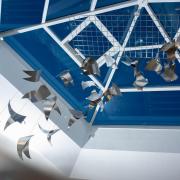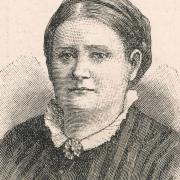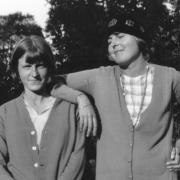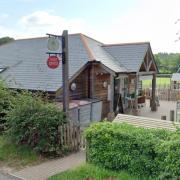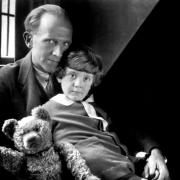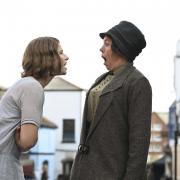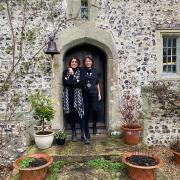Karen Meeson is often up at 6am before setting off to the supermarket, stopping at a cafe or heading off on diverse trips to places such as Gatwick Airport, Dover Castle, the London Eye, Shakespeare’s Globe theatre or a miniature railway. In between are up to four meals a day, playtime and lots of naps - albeit these are all for Frankie as are the majority of outings.
For Karen’s busy life is structured around the nine-month-old Golden Retriever cross Labrador and the five predecessors that have shared her Hastings home. The retired eye nurse is a puppy raiser for Guide Dogs.
She’s one of nearly 300 Sussex volunteers giving up their time in various ways for the organisation that started in 1931 and has since transformed the lives of more than 36,000 people through guide dog partnerships.
The charity, previously known as the Guide Dogs for the Blind Association, is now the world’s largest breeder and trainer of working dogs. It’s also interesting to learn that helpers involved with the dogs, which includes puppy raising, fostering or providing a home for a retired guide dog, don’t necessarily need previous canine experience.
‘I lost my husband nine years ago to cancer and took early retirement a year afterwards, says Karen, 61, as Frankie snoozes contentedly by her feet after a morning walk. ‘I worked in the ophthalmology unit at the Conquest Hospital and had seen working dogs coming in with their owners. We’d always wanted a dog but because I was working 12-hour shifts, the children were off doing all the things they did and my husband’s job took him all over the world it wasn’t fair to have a dog.’
After retiring Karen was diagnosed with, which affects muscle and soft tissue, and is characterised by chronic pain. ‘I knew I needed to do something to get me up and going in the mornings, because if you sit there and dwell on things it doesn’t do you any good,’ she says. ‘I thought ‘I’d love to have a dog’ and thought of Guide Dogs because having been an eye nurse and seen them working I knew what they do and how wonderful they are.’
In the 1960s Guide Dogs started its own breeding programme and up to 1,500 puppies a year come from its centre outside Leamington Spa. The most common are Golden Retriever Labrador crosses which have proved to be hugely successful guide dogs.
‘Puppy day is a wonderful day,’ says Karen. ‘The supervisor arrives and in the back of the van is a seven-week-old little ball of fluff. We’re told the dog we’re getting in advance. Now most of them are sponsored so they already have a name.’
When the puppies are small they can’t go out for a couple of weeks and the puppy raisers are tied to their homes. While Guide Dogs provide foster carers if puppy raisers need to go out for appointments or overnight stays during the entire period they are looking after the dogs it can also work the opposite way, as Karen has found.
‘I often have mine over Christmas as the family all want to come to me,’ she says. ‘They love having a young puppy around.’
Starting with basics such as toilet training and collar wearing, puppy raisers teach basic commands and food manners, acclimatise the dogs to being left alone, travelling, visiting cafes and restaurants, socialising with other people and animals and getting used to different noises.
‘We visit shops, hairdressers, dentist, museums, churches, offices, cinemas and anywhere else we can think of,’ explains Karen. ‘Guide Dogs organises trips to Gatwick Airport, where the dogs go on the tarmac and a plane so they can get used to it. When they first start going out as fluffy puppies it can be very hard as everyone wants to stop and talk to you. It’s like having a new baby, you have nappy bag you take with you everywhere and as they get older it gets lighter. The rewards come as they learn the things you’re trying to teach them and they’re a joy to be around.’
Her first puppy was ‘little black bundle’ Rowley who proved to be quite a handful and a steep learning curve. ‘I didn’t know I was doing and what they were normally like,’ she recalls. ‘He hardly ever slept, just catnapped, and then he was ready to go again. He had a mind of his own right from the start.’
With support from her supervisor, Karen persevered, and head-strong Rowley has matured into an incredible dog. In addition to being a guide dog he has qualified as a dual purpose assistance dog who can fetch items for his owner and even alert her 10 minutes before she faints - one of her medical conditions - by sensing when she’s about to pass out so she can safely prepare for it.
‘When my supervisor came back after Rowley she asked if I was going to do another,’ Karen says. ‘I said I had to so I could see if it was him or me! Along came Dougie who was the most laid-back pup. He and Rowley were like chalk and cheese, and I actually asked my supervisor if they usually slept so much, as he was always napping, and she said they did.’
So what is it like when the time comes to say goodbye? ‘Some people get very upset but I don’t find it a problem,’ says Karen who now also mentors and helps other puppy raisers in the area. ‘All my owners keep in touch and I get photos and updates. I do this because of where the dogs are going and the whole reason for them going is for that job. If you have managed to get them to the point of being a well-balanced calm pup ready to learn their craft that’s what makes it all worthwhile. You feel proud. It’s like your children going off to university.’
Over in Bexhill is Barbara Grice, 74, who has been a fundraiser for more than 40 years and is group organiser of the Bexhill, Hastings and Rother Guide Dogs group. She’s also a past winner of the Maximising Impact accolade at the National Guide Dog People Awards which recognises volunteers, service users and staff.
‘It started in 1976,’ she says. ‘I’d recently moved to Bexhill and I used to see a gentleman with his guide dog walking into town every day and we got chatting. He asked if I’d be interested in doing some fundraising. I had two dogs of my own at the time and the idea appealed to me.’
Barbara organised a sponsored dog walk, which raised £300, and things snowballed from there. ‘We have a great team,’ she says. ‘We organise coffee mornings, attend fetes, classic car shows and events with our stall and hold collections at local supermarkets, garden centres and anywhere anyone will have us. It is very sociable.
Barbara also gives talks, often accompanied by two local guide dog owners and their dogs. ‘People like to know what the dogs have done for them rather than all the facts I can provide,’ she explains.
She also cares for working guide dogs short-term if, for example, their owners go away without them, and has provided a permanent home for 12-year-old retired guide dog Quincy.
‘It’s lovely to have the old dogs and people can apply to rehome them,’ she adds.
Barbara says volunteering has provided plenty of amusing moments along the way. ‘Labradors love food and there have been a number of occasions where people have been sitting at our stall at a fete and all of a sudden their lunch has disappeared,’ she laughs. ‘They also pinch cakes at coffee mornings.’
Barbara says there are many reasons why she enjoys volunteering. ‘There’s no set pattern and every day is different,’ she explains. ‘The phone generally starts ringing about 9am and I could be asked to organise a talk or go to a shop where a collection box needs emptying. Or I might go around local halls to see if we can arrange a coffee morning, there’s always something. Every time I come home there’s usually a box with jigsaw puzzles or stamps in my porch, I never know what I’m going to find.’
‘It does mean so much to me because I know the difference these dogs make in allowing people who are blind or partially sighted to lead a full and active life. It’s just wonderful.’
How you can help
There are 247 active Guide Dogs volunteers in East and West Sussex covering a variety of roles - and sometimes more than one.
More than two million people in the UK live with sight loss, with this number expected to double by 2050. Guide Dogs currently supports just under 4,000 guide dog partnerships. In addition to guide dogs, the charity runs the My Sighted Guide initiative where volunteers help someone with sight loss regain confidence to get out and about again in their local community. In 2021 Guide Dogs supported 1,433 adults through this service and also helped 3,763 children and young people learn skills to help support their independence
Without the help of volunteers Guide Dogs would not be able reach nearly as many people as they do. Whether you’re able to give an occasional hour or make a regular commitment, there are opportunities ranging from raising puppies or raising funds all the way to becoming a volunteer driver or campaigner.
To find out more about volunteering email the Sussex volunteer coordinators at volunteer.maidstone@guidedogs.org.uk or visit the Volunteering for Guide Dogs page at guidedogs.org.uk














